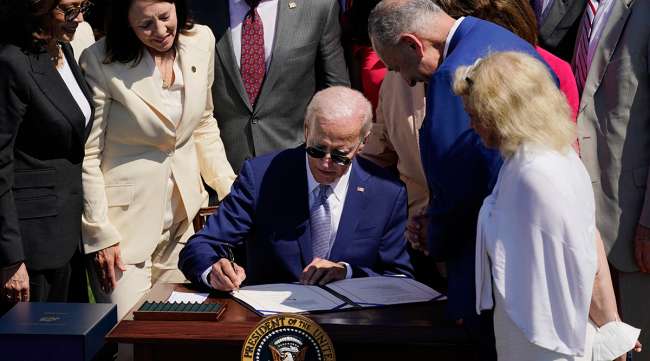Bloomberg News
Biden Signs Order to Fast-Track CHIPS Law Implementation

[Stay on top of transportation news: Get TTNews in your inbox.]
President Joe Biden signed an executive order Aug. 25 to fast-track implementation of a law aimed at boosting domestic semiconductor manufacturing and helping the U.S. compete with China’s dominance in the industry.
The directive establishes a steering committee to help agencies coordinate their efforts to put the law into action and details the administration’s priorities as companies begin applying for and using funds available under the $52 billion CHIPS and Science Act.
The CHIPS Implementation Steering Council will be co-chaired by National Economic Director Brian Deese, National Security Adviser Jake Sullivan, and Office of Science and Technology Policy Acting Director Alondra Nelson, according to a White House memo.
Several Cabinet members will also be on the council, including Treasury Secretary Janet Yellen, Commerce Secretary Gina Raimondo, Secretary of State Antony Blinken and Defense Secretary Lloyd Austin.
The order also lays out six priorities for the federal government to implement the law:
- protecting taxpayer dollars
- meeting national security and economic interests
- developing long-term U.S. leadership in the sector
- strengthening and expanding regional manufacturing and innovation clusters
- attracting private sector investment
- and generating broad benefits for stakeholders such as startups and minority-owned or rural businesses
Want more news? Listen to today's daily briefing above or go here for more info
The Commerce Department also launched CHIPS.gov, to provide updates to the public about the law’s initiatives.
Biden signed the chips legislation into law Aug. 9, one of a string of policy achievements for the president in the last month along with passage of a massive Democratic climate, health care and tax package, and a plan to offer relief for student loan borrowers.
The law aims to sustain long-term research on the development of microchips, used in a range of products including cellphones, electric vehicles and household electronics.
Silicon Valley was a leader in semiconductor development, but the U.S. has since lost market share to manufacturers in Asia. The U.S. share of global microprocessor chip production has fallen to 10% to 12% from 40% production in earlier years, according to Raimondo, who played a key role in advancing the law.




